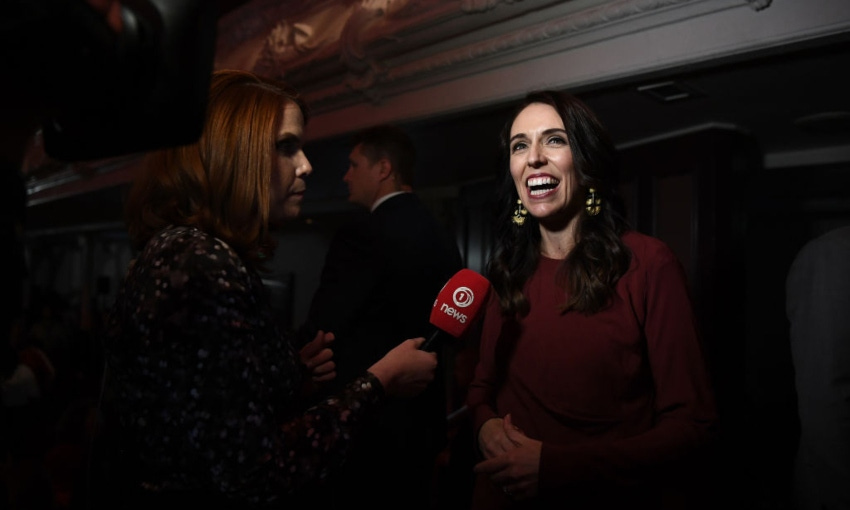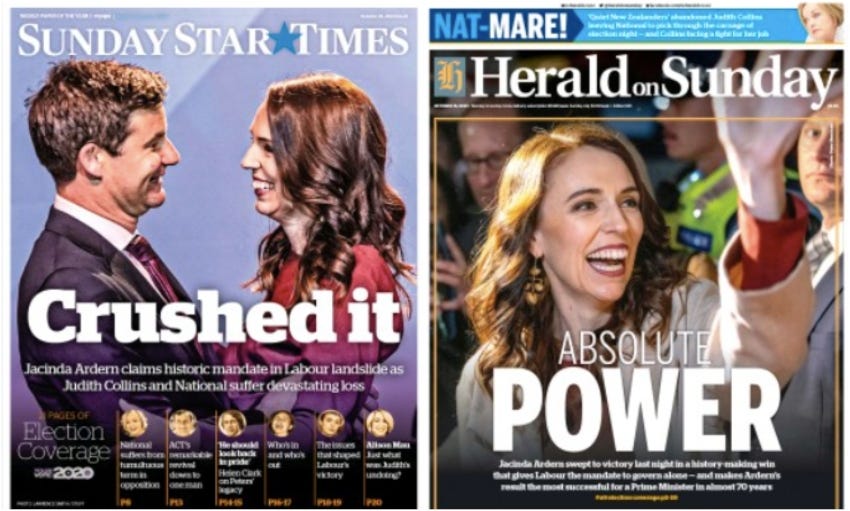Election special: Ardern supreme after crushing Labour win
There has never been a result like this in the MMP era.

Good morning, and welcome to a special election edition of The Bulletin, by Alex Braae for The Spinoff. Presented in partnership with Z Energy.

Image: PM Ardern being interviewed by One News political editor Jessica Mutch-McKay (Getty Images)
You'll probably have heard by now, but the country is waking up this morning to a crushing Labour victory in the 2020 election. Labour has the numbers to govern alone, with a provisional count of 49% of the vote, and 64 seats. There will also be 35 National party seats, 10 each for the Greens and the Act party, and (this is very provisional) one for the Māori Party, with Rawiri Waititi claiming the Waiariki electorate from Tamati Coffey. A reminder – these counts are all provisional based on the special votes, which will be announced in two weeks. You can go back and follow how the night went through our election blog.
But in a general sense, it was a complete and total victory for Jacinda Ardern. Labour won the party vote almost everywhere, with only four electorates going against them. Every South Island electorate backed Labour over National in the party vote, even seats like Southland and Waitaki. The nationwide shift itself was massive – to give a sense of that, National MP Denise Lee eked out a narrow win in the Auckland electorate of Maungakiekie, but Labour won the party vote by 49.6% to 29%. Across the country, the swing was about 12%, which is very unusual for a party already in government. There's an excellent wrap of the night from our political editor Justin Giovannetti, which is a must-read account of how Ardern greeted the results, how the other parties reacted, and what happens now.
And the seats Labour has picked up have completely rearranged the map. Huge swathes of the country that used to be blue turned red, including a clutch of provincial seats. Rangitata, East Coast, Wairarapa, Whanganui, Nelson – all of those seats include some significant rural areas. Holding a lot of them will be a challenge, but for many of those new seat MPs it reflects a lot of work over the last three years to make themselves part of local politics.
For National, it was the second worst defeat the party has ever suffered. They lost a string of electorates which would have been seen as safe, including the stronghold of deputy leader Gerry Brownlee in Ilam. In all, National won 26 electorates, and just 9 list seats. Leader Judith Collins spoke, but didn't take questions at a bleak looking event in Auckland, attended by just a small handful of MPs. She told the room that National would return as a "stronger, disciplined and more connected party."
Will the result mean Judith Collins' leadership is under threat? She's staying on for now, but as often happens in parties that lose badly, that choice might be taken out of her hands. Stuff's Henry Cooke got a quote from an unnamed National MP, who said there will be "blood on the floor" when caucus next meets. A problem for the party is that they've brought a relatively small number of list MPs in, and a tiny number of new MPs overall, meaning their caucus will have a huge deficit of both diversity and fresh blood.
The Greens saw some significant gains. They'll bring in three new MPs off the list, but the bigger story happened in Auckland Central. Chlöe Swarbrick picked up the party's first electorate seat since the late 90s, after a storming campaign through a tight three-way race. When she first announced the run in June, many thought it would be impossible – then there were some dramatic changes in circumstance, and the party flooded the seat with campaign energy and volunteers. Stuff reports it was a shock win, with just a few hundred votes between Swarbrick and Labour's Helen White. If there is any disappointment for the party, it will be that on the numbers, they once again don't have much leverage over Labour to force through policies.
For Act, it was a massively improved showing on their 2017 result. Duncan Greive was at their party at Headquarters in Auckland, where the vibe from leader David Seymour was upbeat. He will be bringing through a huge contingent of new MPs – apart from deputy leader and former staffer Brooke van Velden, they'll have pretty much no experience of parliament. Watching how that all plays out will be a fascinating story over the next three years.
New Zealand First is now gone from parliament, after last falling out in 2008. One News reported that Winston Peters told those gathered in Russell that the party had provided "certainty and stability" for the country over their last term in government. He also hinted that it wasn't the end of the road, saying "as for the next challenge, we’ll all have to wait and see”. None of their MPs pushing for a seat came close, with Shane Jones and Ron Mark both a long way off the pace.
There was a mention before of Waiariki, and it's worth dwelling a bit on what it could mean to have the Māori Party back in parliament. The NZ Herald's Michael Neilson has a great wrap of how Rawiri Waititi was able to score the upset win, the issues the party campaigned on, and what happens now for the co-leaders, neither of whom won their races. Stuff's Carmen Parahi has written this morning in more general terms about how the overall election result will demand more of Labour's Māori MPs – it's fair to say that with an independent Māori voice in parliament, that conversation changes.
It was a tough night for the rest of the minor parties, as these elections so often are. The New Conservatives and The Opportunities Party both got around 1.5%, which isn't a bad result under the circumstances of a landslide. Beyond that, Advance NZ got 0.9, and the ONE Party and Legalise Cannabis finished on 0.3%. The rest were all on 0.1%, or thereabouts. Heartland party leader Mark Ball came a very strong third in Port Waikato. And a particularly amazing detail of it all – Legalise Cannabis leader Maki Herbert managed to beat Advance NZ co-leader Billy Te Kahika in the candidate vote for Te Tai Tokerau.
Turnout appears to be up a fair bit on the last election. The Electoral Commission put out a release very early in the morning, saying an estimated 82.5% of registered voters had cast a ballot. That's up 79.8% from last time around – always a good sign for a healthy culture of democracy.
So what does it all mean? Danyl Mclauchlan has put together an exceptional feature on the stories that drove the campaign, the strategies different parties used for better or worse, and the events that led to this result. That last point is particularly important – for many voters, their minds will have been made up well before this campaign, and will have been driven by the extreme nature of what has happened this year.
Many of those who voted Labour in this election won't necessarily be natural supporters. Throughout the campaign there has been a strong push from Labour – particularly from Grant Robertson – that people who voted for National of 'Key and English' should lend Labour their vote for this particular moment of pandemic and economic turmoil. That in turn will lead to questions about what exactly their mandate is for – is it for transformational change, or for governing as close to the centre as possible? We'll have much more coverage on this question over the coming three years. In the meantime, keep an eye on our live updates as PM Ardern prepares to form the next government.
Got some feedback about The Bulletin, or anything in the news?
Drop us a line at thebulletin@thespinoff.co.nz

Image: The front pages of today’s Sunday papers tells a pretty clear story of the night.
What else? As always with elections, there are some interesting takes and analysis. One such piece comes from data specialist Mitchell Palmer, who calculated how much each major party candidate performed compared to the party vote in their seat. There are caveats on this of course, because each electorate is run under individual circumstances, but in some cases we can see candidates notably over or underperforming relative to their colleagues. If you see more posts that dive into the details of the election, please feel free to send them my way – thebulletin@thespinoff.co.nz.
Internationally, the result will enhance the already prominent global stature of Ardern. CNN, the BBC and the Guardian all described it as a "landslide", and it's one of those moments where you get a better sense of the scale of the win by seeing how it gets written up for international audiences. An analysis piece in the Sydney Morning Herald gave a good insight into how many in the English speaking world will see the result – it was a Covid election, and the handling of the pandemic earned the trust of the electorate, even if there are big challenges on the horizon.
Finally, for many people a lazy Sunday now beckons. If you want to change gear and get in the mood for an All Blacks game later on, I suggest you read these two pieces by The Spinoff's Justin Latif. In the first, he writes about two Māngere College old boys, who have ended up on opposite sides of the trans-Tasman clash, and the inspiration that gives to kids at the school today. And in the second, he laments that the drop goal isn't recognised as a rugby art form, when they can be both beautiful and highly effective. Who knows, maybe the droppie won’t be needed, and we’ll see two blowouts this weekend.
That's it for The Bulletin. If you want to support the work we do at The Spinoff, please check out our membership programme





Thanks Alex - a great wrap as always.